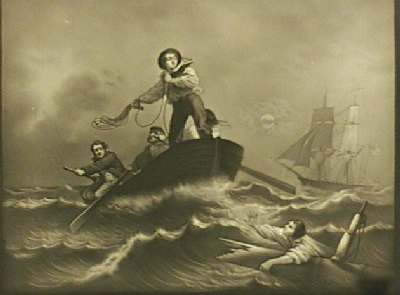Romans 3:27
Romans 3:27 (see also Ephesians 2:8)
Where then is boasting? It is excluded. By what kind of law? Of works? No, but by a law of faith.
Similarly, Romans 4:5 states: “But to the one who does not work, but believes in Him who justifies the ungodly, his faith is credited as righteousness.”
One Calvinist writes: “I will tell you exactly when faith in Christ is a work (that is, a work OF MAN). Exercising faith in Christ is made to be a work when it is taught to be something which is left up to man to exercise or not and the determinant cause of his faith finally rests with him.”
Another Calvinist writes: “God is the one who saves and it has nothing to do with our chosing him, making the right decision or any other work you come up with.”
In other words, if you say “yes” to Christ, without an irresistible force making the choice for you, then your decision to say “yes” is necessarily a work, and thus all non-Calvinists have “their choices” as something about which they can boast. Calvinists thus allege that only Calvinism (and its associated Irresistible Grace) can mitigate against pride and boasting, which is ironic, because while making these otherwise pius-sounding arguments, Calvinists often display the very worst of denominational pride and doctrinal boasting, and which means that Calvinism has the opposite of its intended effect. The reality, though, is that the Bible never defines “works” in a manner described by Calvinists. So Calvinists are merely using their own human reasoning by philosophical speculation, when defining works.
Question: Did the apostle Paul ever say, “unless you are involuntarily made to believe, this would inevitably constitute a meritorious work?”
Answer: No, but Calvinists believe that anything that which is voluntary, is by definition, a meritorious “work.” So when Calvinists insist that faith is a gift, they don’t merely mean that the ability is a gift (since that would still involve voluntary choice), they mean that the involuntary completed action of faith, is a gift. So, essentially, Calvinists insist that Irresistible Grace is the gift. Calvinists believe that irresistibility alone is what mitigates against boasting, such that the Law of Irresistibility (rather than the “law of faith”), excludes boasting.
Norman Geisler: “...it is a mistake to believe that the exercise of faith or trust in God’s complete provision for our salvation is a ground for boasting. As a condition for salvation, faith is opposed to work and works are opposed to faith.” (Chosen But Free, p.72, emphasis mine)
Calvinists say that if you voluntarily believed, then you can boast of your volunteerism. Romans 3:27, however, points out something that refutes that idea, which is that when you believe, you can’t boast. In other words, whether you believe voluntarily or involuntarily, it makes no difference, since the “law of faith” excludes all boasting under all circumstances, especially since faith is not about trusting in yourself, but about trusting in someone else, namely, God. But to a Calvinist, only a “law of irresistibility” can successfully mitigate against boasting. Why? Because Calvinists are not using a biblical foundation for their conclusion, but a philosophical foundation. “No,” says the Calvinist, “because whatever you have, you have it, not of your own.” 1st Corinthians 4:7 states: “For who regards you as superior? What do you have that you did not receive? And if you did receive it, why do you boast as if you had not received it?” This speaks of God’s spiritual gifts to Christians, but the Calvinist relegates it to an elect group, unconsciously receiving salvation. Essentially, the Calvinist reasons that it is not faith, but Determinism, which mitigates against boasting. So let’s test that theory:
Question: Do you suppose that the man in the water
being rescued has any legitimate basis upon which to
brag that he rescued himself?
Answer: This is the absurdity which Calvinists are
stuck with, when they suppose that a person
voluntarily receiving Christ, somehow makes them
their own Savior.
Question: Does a patient’s consent to surgery rob
the doctor of his credit in performing the surgery?
Answer: Faith in Christ is an act of consent,
when God comes to us, rather than us coming to God.
When God comes to us, either we consent to His will
and repent, or we refuse and remain in sin. Our
act of consent, no more robs God of His credit in
performing spiritual surgery, than a patient’s act of
consent robs a surgeon of his credit in performing
physical surgery.
Question: “If a rich man offers alms to a beggar,
and the beggar puts out his hand to receive them,
do the alms suddenly become the work of the beggar?”
(John Calvin Goes to Berkeley, p.179)
Arminian, Roger Olson, provides a terrific analogy
for this situation entitled: Grace and free will: a parable.
One Calvinist preacher declared: “You think you had a hand in your salvation!” (The Chosen Fool)
Naturally, the non-Calvinist is puzzled by such a statement. After all, who is the One who died on the cross? Since it wasn’t me, how could I be claiming credit? But that’s not what Calvinists mean. A closer look reveals that Calvinists mean to suggest that if you claim to have repented of your sins and accepted Jesus Christ of your own voluntarily free-will, then you have taken credit for volunteering:
Calvinist, James White: “Indeed, all other answers must at some point be because I was better than those who did not believe.” (Debating Calvinism, p.100, emphasis mine)
Calvinist, Erwin Lutzer: “Because salvation rests wholly with God, no one can say he chose Christ because he is wiser than others; he did so because God had chosen him and quickened him that he might believe. Calvinists have often accused the Arminians of taking at least a bit of credit for their salvation.” (The Doctrines That Divide, p.181, emphasis mine)
Question: Does it matter?
Answer: According to Romans 3:27, boasting either is excluded by a “law of faith,” or is not, and thus there is indeed grounds for boasting with faith, as Calvinists contend. So the real question is whether the law of faith excludes boasting in all circumstances. According to Calvinism, no, if you chose to believe, without God making the choice irresistible for you. So according to Calvinism, the only thing that can truly mitigate against boasting is the law of irresistibility, which has a rather interesting side-effect. It means that whether you are saved through faith, or through works, or through the sacraments or through whatever, it doesn’t matter one bit, as long as the choice to do it is effectually rendered irresistible, which in that case, means that, per Calvinism, you cannot boast about it. In this way, a Catholic could be right at home with Calvinism, as long as whatever a person does for salvation is the sole product of irresistibility.
Consider the following quotes to see how Calvinists express the bizarre nature of the Calvinist teaching that faith in Christ is a meritorious deed of self-righteousness, which flies in the face of the aforementioned Scripture verses relating to faith:
Calvinist: “Do I believe in the Doctrines of Grace? Yes. The alternative is to believe that I can save myself, make myself fit for heaven, forgive my own sins. But of course I can’t do any of that. Ephesians 2.8-10: 8 For by grace you have been saved through faith, and that not of yourselves; it is the gift of God, 9 not of works, lest anyone should boast. 10 For we are His workmanship, created in Christ Jesus for good works, which God prepared beforehand that we should walk in them.” (Baptist Board, emphasis mine)
Calvinist: “You are either saved thru the merit of Christ alone, independent of your actions, prayers, tears, understanding, or speech, or you are saved because you took some action about what Christ did. Can’t be two ways. Speak only from one side of your mouth, please.” (Baptist Board, emphasis mine)
“Saved...independent of your...prayers”? Romans 10:13 states: “Whoever will call on the name of the Lord will be saved.” How do you suppose that we call upon the name of the Lord, but by prayer?, with the result that we become saved? Listening to Calvinists often invokes Galatians 3:1 in my mind: You foolish [Calvinists], who has bewitched you?, and the answer is Theistic Fatalists.
Calvinist: “As a matter of fact, it’s quite an exclusive club of sinners and scum hand-picked by God before we were born according to no merit of our own, born not of blood, the will of the flesh nor the will of man, but of God. Aren’t you a member? Or did you ditch this club in order to say you joined yours of your own free will?” (Baptist Board, emphasis mine)
The common denominator of all of these Calvinist sentiments is one thing: Calvinists believe that trusting in someone else diverts credit from the one in whom you are trusting, and steers it toward the one doing the trusting. However, if you surrender yourself to the plain words of Scripture at Romans 3:27 and 4:5, faith in Christ explicitly “excludes” all self merit and self-righteousness.
However, Calvinist John Piper: “Trust is the one thing that can put God in debt. The reason trust can do this, is that it is the one human attitude that looks away from our sufficiency to God’s sufficiency. When God’s sufficiency is at stake, he will prevail.” (On Lending to God, emphasis mine)
One member of The Society of Evangelical Arminians: “Notice how Piper articulates the non-meritoriousness of faith, indeed, in an extreme way that many Arminians would not (i.e. we would not say that faith puts God in our debt). Nonetheless, his articulation is helpful for its eloquence in pointing out the fact that faith is not meritoriousness, nor a work even though it is something we do that God responds to by saving us.” (SEA)
Even John Calvin stated: “Now it may be asked how men receive the salvation offered to them by the hand of God? I reply, by faith. Hence he concludes that here is nothing of our own. If, on the part of God, it is grace alone, and if we bring nothing but faith, which strips us of all praise, it follows that salvation is not of us. … When, on man’s side, he places the only way of receiving salvation in faith alone, he rejects all other means on which men are accustomed to rely. Faith, then, brings a man empty to God, that he may be filled with the blessings of Christ.” (Calvin’s New Testament Commentaries: Galatians, Ephesians, Philippians and Colossians, p.144, emphasis mine)
Question: Does the Bible ever contrast grace against faith, so as to say that we are saved by grace, and not by faith, lest any man should boast?
Answer: It’s the exact opposite. Romans 4:16 states “For this reason it is by faith, in order that it may be in accordance with grace....”
Question: Why does faith “exclude” boasting?
Answer: Because faith is not act of Self-righteousness, but Imputed-Righteousness. The former boats of what we have done, while the latter boasts of what someone else has done. That’s the difference. Trusting in someone else does not make you a good person, but rather speaks of the good of the one in whom you are trusting. Faith in Christ boasts not of yourself, but of Christ.
Consider Luke 18:9-14: “Then Jesus told this story to some who had great self-confidence and scorned everyone else: ‘Two men went to the Temple to pray. One was a Pharisee, and the other was a dishonest tax collector. The proud Pharisee stood by himself and prayed this prayer: “I thank you, God, that I am not a sinner like everyone else, especially like that tax collector over there! For I never cheat, I don’t sin, I don’t commit adultery, I fast twice a week, and I give you a tenth of my income.” But the tax collector stood at a distance and dared not even lift his eyes to heaven as he prayed. Instead, he beat his chest in sorrow, saying, “O God, be merciful to me, for I am a sinner.” I tell you, this sinner, not the Pharisee, returned home justified before God. For the proud will be humbled, but the humble will be honored.’” [NLT]
Question: Exactly how would this tax collector have any room to boast?
Answer: He wouldn’t, just as Adrian Rogers states, “...salvation is not a reward for the righteous. Salvation is a gift to the guilty.” (Salvation: Romans 10:1-13)
Dave Hunt: “Furthermore, that righteousness cannot come by works is also irrelevant to free will. Those who believe in free will also affirm that man is ‘justified freely by His grace.’ But grace cannot be forced upon anyone or it would not be grace. Thus, it takes the power of choice for man to assent to God’s grace and to receive the gift of salvation God graciously offers.” (What Love is This?, p.233)
Question: Why does a person choose one way over another?
Answer: Consider 1st Corinthians 10:13: “No temptation has overtaken you but such as is common to man; and God is faithful, who will not allow you to be tempted beyond what you are able, but with the temptation will provide the way of escape also, so that you will be able to endure it.”
One member of The Society of Evangelical Arminians explains: “God promises Christians that they never have to sin. He gives grace to aid the Christian so that the Christian can resist temptation, even though he is obviously able to give in to temptation. So if you take two Christians, and one gives into temptation, while another does not, then why does one give in while the other remains faithful? It cannot be a difference of grace--they are both able to resist the temptation. By the Calvinist argument, it must be because one has some good in him, apart from God or grace, and must be able to legitimately boast. But this is obviously, patently unbiblical, and shows how the Calvinist argument is invalid.”
One member of The Society of Evangelical Arminians: “Trust in another gives no glory to the truster and all glory to the trusted. Faith is the renouncing of any merit, but reliance on God and his unmerited favor. Thus, faith is the perfect vehicle through which God could have a fair basis for accountability and yet there be no merit in the basis of accountability. The Arminian need not run away from the fact that there is indeed a difference between the believer and unbeliever that leads to salvation vs. condemnation. We should embrace it. That’s what makes God’s salvation of believers and condemnation of unbelievers, not arbitrary. It is the very point we want to claim against the Calvinist view that God saves and rejects unconditionally. It is the non-meritorious means of faith, through which, we are saved. Mark well: The question of what the difference between the one who has faith and the one who does not, is simply that one trusts God and the other does not. This is why God saves one and condemns the other, by his own sovereign will and grace. He is not obligated, but out of unmerited favor, reckons faith as righteousness. And this provides for a non-arbitrary basis of non-meritorious salvation and de-meritorious condemnation, so all the glory goes to God for salvation and all the blame goes to man for his own condemnation.”


